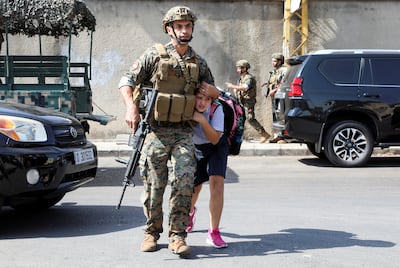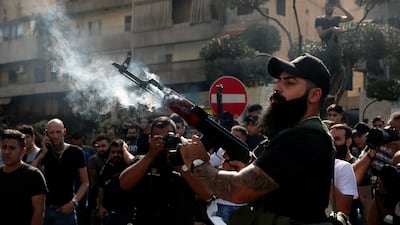A bruised Beirut held funerals on Friday for those killed in street clashes the previous day, as the country examined its wounds from some of the worst violence seen on the streets of the Lebanese capital in more than a decade.
It is not lost on many in Lebanon that the clashes took place along an old Lebanese Civil War flashpoint – the street names and parties slogging it out were the same ones who fought in a 15-year conflict that tore the country apart. Some newspaper headlines could have been copied and pasted from 40 years ago.
While the country’s economic and social collapse over the past two years has been well documented, analysts say the violence this week harks back to deeper issues emanating from the country’s handling of the civil war that lasted from 1975 to 1990.
“Lebanon is the perfect example showing peace at the expense of justice – which happened to end the civil war in 1990 – does not work,” said Nour El Bejjani Noureddine, who heads the Lebanon programme at the International Centre for Transitional Justice non-profit organisation.
“We are still living in a recurrent cycle of violence. The common denominator of victims of political violence – whether from yesterday or from the civil war – is always the lack of justice and accountability,” she said.
“If we don’t deal with the past, we will have to deal with this violence again and again and again. Consecutive governments have failed to deal with the past."
An amnesty introduced to help end the war saw just a handful of individuals responsible for the conflict's violence held to account.
Ms El Bejjani, said the ramifications of that decision could be seen in the street violence in Beirut on Thursday.
Snipers fired upon demonstrators planning to protest against an arrest warrant issued by the judge leading the investigation into the Beirut port blast.
The August 2020 chemical explosion killed more than 200 people, injured more than 6,000 and destroyed large areas of the capital.
“With the port explosion and the investigation and all the obstacles being put in front of these investigators, we see how powerful warlords from the civil war are still in power,” she said.
“They come together whenever their immunity is threatened.
Christophe Abi-Nassif, Lebanon programme director at the Middle East Institute think tank, said the country’s dominant political parties are deploying tactics honed during the civil war to disrupt the investigation into the Beirut port blast.

“Broadly speaking, Lebanese political parties are once again leveraging religious affiliations, identity politics, and threats of civil war to divert attention away from the port blast investigation, thereby cementing their favourite, forcibly imposed trade-off: civil peace and stability versus justice and accountability,” Mr Abi-Nassif told The National.
He said the country’s botched dealings with the civil war, and past more generally, feed the sort of events that have shocked Beirut in recent days.
“These tactics have worked for them in the past – more particularly since the general amnesty law was passed in 1991 – resulting in a series of inconclusive or botched investigations and political reconciliations that favoured maintaining the status quo over finding and publicising the truth,” he said.
Lebanon has not dealt with its civil war demons, say analysts, and as the country’s economic and social collapse continue to worsen by the day, it is the barely tended wounds of the civil war that are likely to open once again.


